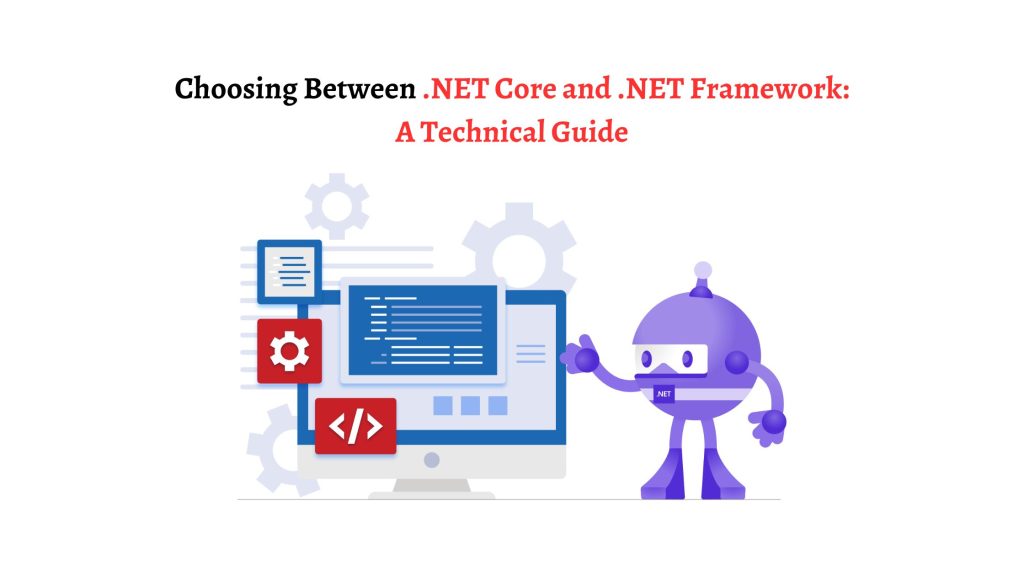Selecting the right framework for software development works as a linchpin and ensures the project’s success. Those navigating the Microsoft ecosystem have different choices available now, such as choosing between .NET Core and .NET Framework. Both Microsoft frameworks have stayed in the market for a long time and are widely used in various applications and development projects. For businesses that are aiming to carve their digital footprint, partnering with a proficient dot net app development company is not just a strategic move but a necessity. A professional company not only helps to unravel the intricacies of .NET Core and .NET Framework but also offers a technical compass for those embarking on the journey of creating transformative applications with the help of .NET framework. Before you discuss the intricacies of both .NET frameworks with a dot net app development company, consider this blog post as a handy guide to give your conversation a constructive, engaging session.
Understanding the Basics
.NET Core: .NET Core is an open-source, cross-platform framework that breathed fresh air into the .NET ecosystem. It is modular and lightweight and allows developers to build and run Windows, Linux, and macOS applications. Its cross-platform nature and emphasis on performance make it a compelling choice for modern, cloud-native applications.
.NET Framework: Conversely, .NET Framework has been the stalwart of Windows development for years. With time, it matured with a rich set of libraries and features. While it has historically been confined to the Windows operating system, it provides extensive support for building desktop applications, web applications, and services.
Factors Influencing the Decision
1. Platform Compatibility
.NET Core: Recognized for its cross-platform capabilities, .NET Core is the go-to choice if your application needs to run on various operating systems. This is particularly relevant in cloud computing and diverse deployment environments.
.NET Framework: Primarily Windows-centric, .NET Framework is ideal for applications targeting the Windows platform. If your application is expected to run exclusively on Windows servers, the mature and feature-rich .NET Framework may be a suitable choice.
2. Application Type
.NET Core: Best suited for modern, cloud-native applications and microservices. .NET core has a modular architecture that allows developers to include only the necessary components, reducing the application’s footprint.
.NET Framework: .NET framework is a well-established tech stack choice among teams for building various applications, including desktop applications (Windows Forms, WPF), web applications (ASP.NET), and enterprise-level services. If your project involves traditional Windows application development, .NET Framework might be the conventional yet robust choice.
3. Performance
.NET Core: Recognized for its high-performance characteristics, .NET Core is optimized for speed and resource efficiency. This makes it an excellent choice for applications that demand rapid response times and scalability.
.NET Framework: While robust and reliable, .NET Framework may not match the performance benchmarks set by .NET Core. If your application requires optimal performance and scalability, .NET Core is the preferred option.
4. Development Ecosystem
.NET Core: Despite being initially lean, .NET Core’s ecosystem has matured rapidly. It benefits from a growing community and a vibrant package ecosystem on NuGet.
.NET Framework: Boasting a well-established ecosystem, .NET Framework has a vast library of third-party components and tools. If your project heavily relies on existing .NET Framework libraries, migrating to .NET Core might involve some adjustments.
5. Long-Term Support
.NET Core: Embracing the modern approach of Long-Term Support (LTS) releases, .NET Core provides a clear and predictable support lifecycle for each version.
.NET Framework: With its traditional release model, .NET Framework versions might have longer support timelines. However, the future focus of Microsoft is on .NET Core and its successor, .NET 5 and beyond.
Migration Considerations
Suppose you have developed the application using .NET Framework but are now looking to leverage cross-platform compatibility and contemplating a move to .NET Core. In that case, there are essential migration considerations you must not avoid, such as:
- API Compatibility: Assess the compatibility of your existing APIs with .NET Core. Some APIs might have equivalents in .NET Core, while others may require adjustments.
- Dependency Evaluation: Evaluate third-party dependencies and libraries to ensure they are compatible with .NET Core.
- Tooling Support: Check the support for your preferred development tools and IDEs in the context of .NET Core.
- Performance Testing: Conduct thorough performance testing after migration to ensure that your application meets or exceeds the performance standards achieved with .NET Framework.
Making the Decision
The choice between .NET Core and .NET Framework hinges on your project’s unique requirements. Consider the following questions when you have to decide one framework for your project requirements.
- What platforms do you need to support?
- Is performance a critical factor for your application?
- What type of application are you developing?
- Are you starting a new project or migrating an existing one?
Conclusion
The choice between .NET Core and .NET Framework is not just a technical decision; it’s a strategic move that can shape the future of your applications. Partnering with a reliable dot net app development company is necessary to navigate this terrain successfully. Their expertise in leveraging the strengths of either framework, combined with tailored dot net app development services, ensures that your projects are delivered and flourish in the competitive digital landscape. As you embark on your development endeavors, the right partnership can make all the difference, propelling your applications to new heights of innovation and efficiency.
Also read Technology


